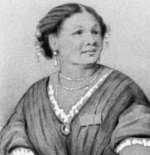 Shocking news – a big concert to raise money for the Mary Seacole Statue Appeal last week was cancelled at short notice, no reason given. I’ve tried to find out why from the Mary Seacole cheerleader-in-chief, Mrs Elizabeth Anionwu, but have not heard back from her yet. But still, on the positive side, a “miniature locomotive” in Reading was recently named after Ms Seacole, and an infants school in Hackney have performed a musical celebration of her life. There has been an official wreath laying at her grave, the opening of a new Mary Seacole extension to a school, Coutts Bank – the bank of choice for all African-Caribbean people – has held a display of pictures of Mary Seacole and a new photograph of Mary Seacole has been unveiled at a museum.
Shocking news – a big concert to raise money for the Mary Seacole Statue Appeal last week was cancelled at short notice, no reason given. I’ve tried to find out why from the Mary Seacole cheerleader-in-chief, Mrs Elizabeth Anionwu, but have not heard back from her yet. But still, on the positive side, a “miniature locomotive” in Reading was recently named after Ms Seacole, and an infants school in Hackney have performed a musical celebration of her life. There has been an official wreath laying at her grave, the opening of a new Mary Seacole extension to a school, Coutts Bank – the bank of choice for all African-Caribbean people – has held a display of pictures of Mary Seacole and a new photograph of Mary Seacole has been unveiled at a museum.
There’s also an extremely good piece about Mary Seacole by a chap called Tony Sewell in The Voice. Mr Sewell confesses that he is utterly mystified at the championing of this lady who helped out during the Crimean War. He says:
“I find our desperation to win the arm wrestle with Florence Nightingale a sad case of ‘black histrionics’. We want black heroes and heroines at any cost. We read what we want in Mary Seacole’s life and carefully miss some key facts.”
Among those key facts, according to Sewell, was that she did not have much time for “niggers”, took no notice of the issues of racial equality and was a sort of “Katie Price” of her age. It would be better, he says, to erect a statue to a bunch of black Peckham schoolkids who pass their GCSEs. Needless to say, Sewell is taking a bit of a battering for this on The Voice website, but he could not have summed up the case more eloquently – especially the last point. And I don’t suppose I am helping his case much by agreeing with him. But my argument is the same as Sewell’s – the championing of Mary Seacole is stupid, patronizing and knee-jerk political correctness which actually, in the end, devalues the contribution of black people to this nation’s history. Seacole has become British History’s token black; she is the modern equivalent of the situation comedy Love Thy Neighbour.
It is not her fault, of course, but Seacole’s position in the curriculum is misleading to schoolkids – who now view her as the key figure from the nineteenth century – and insulting to both whitey and darkie.







Comments